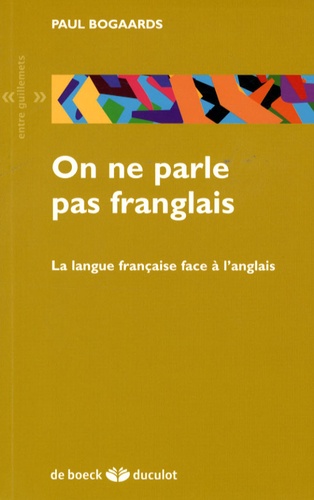====== part 1 Franglais ======
In English, Franglais means a mangled combination of English and French, produced either by poor knowledge of one or the other language, native bilingualism, or humorous intent. Franglais usually consists of either filling in gaps in one's knowledge of French with English words, using false friends with their incorrect meaning, or speaking French in such a manner that (although ostensibly "French") would be incomprehensible to a French speaker who does not also have a knowledge of English (for example, by using a literal translation of English idiomatic phrases).
Some examples of Franglais are:
- Longtemps, pas voir. – Long time, no see.
- Je vais driver downtown. – I'm going to drive downtown. (Je vais aller en voiture au centre-ville)
- Je suis tired. – I am tired. (Je suis fatigué)
- Je care pas. – I don't care. (Ça m'est égal OR Je m'en fiche)
- J'agree. – I agree. (D'accord)
- M'en va gazer mon char. (Québec) – I'll go fill up my car. (Je vais faire le plein)
QUEBEC LINKS:

[ # 1] Josh Freed, journalist, documentarian and chronicler at The Gazette since the frogs had fur. This text was written in 1991
- "I know I can't judge the world by my street - but I suspect my neighborhood is not that different from the rest of the city or the country."
[ # 2] Sammy glides effortlessly between English and French in his shows, and has made Quebec’s tortured identity politics his main preoccupation.
A Quebec Comedian ... Sammy: humour and taboo ( * )
FRENCH LINKS:
Oui, je parle franglais. Et alors? - ( * )
====== part 2 ======
Paul Bogaards.
On ne parle pas franglais, La langue française face a' l’anglais.
Bruxelles: de boeck duculot. 2008. 207 pages.
ISBN 978-2-8011-1417-9. Price15,50
REVIEW: Henri Béjoint
- LES ANGLICISMES DU FRANÇAIS
- Anglicismes et emprunt linguistique
- Evolutions en français
- Traits caractéristiques des emprunts
- Des anglicismes à tous les niveaux de la langue
- Définir l'anglicisme
- les anglicismes dans le lexique français
- Les anglicismes dans l'évolution du lexique français
- La fréquence d'emploi des anglicismes
- LA DEFENSE DU FRANÇAIS
- Etiemble et le franglais
- Le français au cours des siècles
- Les structures de défense du français
- L'Etat comme législateur dans le domaine de la langue
E. Étiemble’s Parlez-vous franglais? was an immediate best seller when it was published in 1964, and its success says something of the relations between the French and their language. It had several new editions until 1991, and is still in the publishers’ catalogue, evidence that the reasons for its initial popularity are
still with us. The main argument was simple: the French language had been
corrupted beyond recognition by its extensive borrowings from English,
particularly American English, over the preceding decades and it had been
reduced to what E´ tiemble called an ‘Atlantick sabir’, a Frenglish gibberish.
The book was a mixture of scathing mockery, desperation and fear: Parlez-vous
franglais? was the chronicle of a death foretold, the song just before the swan
song. It was also fiercely anti-American, not an uncommon attitude in 1964,
though more surprising in someone who was an eminent Professor at the
Sorbonne and who had fled to the USA during World War Two.
Étiemble’s book was one of the most vocal expressions of an attitude that
has existed in France since the 18th century, ‘le purisme’, a dedication to the
purity of the language, to its protection from foreign influences and to the
conservation of its ‘soul’ (do languages have a soul?), an attitude that can verge
dangerously towards bitter nostalgia and xenophobia.
(...)
On the whole, Bogaards’ book is interesting, clear, pleasant to read, with just the right dosage of erudition and humour. It renders an immense service to anyone interested in the question of the purity of French: that of exposing undisputable facts in a domain that has been more marked by passion than by academic expertise.
References
E´tiemble, 1964. Parlez-vous franglais? Paris: Gallimard.
Tournier, J., 1998. Les Mots anglais du franc¸ ais. Paris: Belin.
International Journal of Lexicography,
Volume 22, Issue 1, 1 March 2009, Pages 102–105

No comments:
Post a Comment